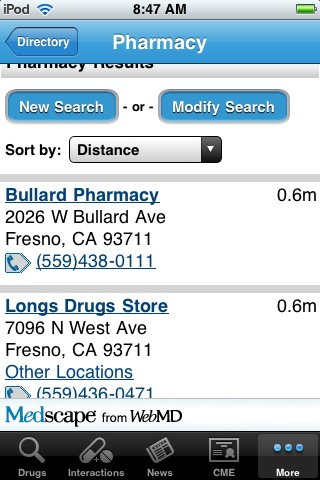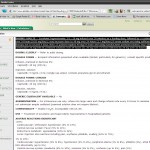Below is a list of drug information resources for both mobile devices and online access. I’ve used most, but not all, of these resources and have found the mobile versions to be a valuable resource when you’re on the go. While it is possible to access the online versions of these resources via a smartphone, the mobile applications are designed with the smaller screen in mind and therefore, in my opinion, work better then the online versions when using a mobile device.
Let me know if I missed any. Also feel free to comment on your favorite.
Mobile:
 Lexi-Comp – Available for the Palm OS, webOS (in beta), Windows Mobile, i.e. Pocket PC, BlackBerry, Mobile browser based support for Internet Explorer, Safari Mobile, Opera Mobile 8.65 and higher and Opera Mini 4.1 (to verify your mobile browser is compatible with the MOBILE site, please visit http://m.lexi.com/test within the browser on your device), and the iPhone. Lexi-Comp is the king of mobile drug information resources and definitely the most respected among drug information professionals, i.e. pharmacists. It’s a little pricey, but worth it.
Lexi-Comp – Available for the Palm OS, webOS (in beta), Windows Mobile, i.e. Pocket PC, BlackBerry, Mobile browser based support for Internet Explorer, Safari Mobile, Opera Mobile 8.65 and higher and Opera Mini 4.1 (to verify your mobile browser is compatible with the MOBILE site, please visit http://m.lexi.com/test within the browser on your device), and the iPhone. Lexi-Comp is the king of mobile drug information resources and definitely the most respected among drug information professionals, i.e. pharmacists. It’s a little pricey, but worth it.
Epocrates – Available for the iPhone, BlackBerry, Palm (not webOS), WinMobile and Windows Smartphones. – Epocrates is available as free or paid service. This drug information resource is popular among nurses and physicians. Most pharmacists I know have it on their mobile device because it’s free, but will reach for Lexi-Comp if given the choice.
Clinical Pharmacology OnHand for Pocket PC and Palm – Fee for service and I’ve never used it.
Thomson Clinical Xpert (mobileMICROMEDEX ) – You can probably count this one out as it is only available for the Palm and Pocket PC operating systems. I’ve used it on a Palm device and it was nothing to write home about.
Skyscape – Several offerings like AHFS for many platforms including Android, BlackBerry, iPhone/iPod Touch , Palm OS, Symbian (Nokia), and Windows Mobile/Pocket PC/Smartphone. Skyscape offers a free version of their drug information resource for the iPhone/iPod touch. The UI is clunky and it won’t replace Lexi-Comp or Epocrates, but it’s worth having as a secondary reference. One thing I find interesting about the Skyscape website is their separation of PharmD and Pharmacist into two different user categories. What exactly do these guys think a PharmD is anyway?
PEPID – Available for the Palm OS, Windows Mobile, BlackBerry, and iPhone. PEPID stands for Portable Emergency Physician Information Database and is designed as a reference for emergency personnel. Not comprehensive drug information, but again, worth having.
Medscape offers a free drug information app for the iPhone/iPod touch. It includes a drug interaction checker, medical news and CME for physicians. However, the best feature is the Pharmacy directory. Take a look at the image to the right. I put my home zip code into the find pharmacy feature of the Medscape app and it threw up several nearby pharmacies. Cool.
Online:
 Lexi-Comp ONLINE with AHFS – The de facto standard for drug information resources. The facility I’m currently in offers only a piece of the Lexi-Comp online references as part of our UpToDate subscription (a great medical reference in its own right). I’ve used Lexi-Comp in other facilities that I’ve worked in and it is fantastic.
Lexi-Comp ONLINE with AHFS – The de facto standard for drug information resources. The facility I’m currently in offers only a piece of the Lexi-Comp online references as part of our UpToDate subscription (a great medical reference in its own right). I’ve used Lexi-Comp in other facilities that I’ve worked in and it is fantastic.
MICROMEDEX – I’m not quite sure why, but this seems to be the drug information resource for most hospitals. I’ve used it at the last three hospitals I’ve worked in and have never been impressed with it. Maybe it’s widely used because it was one of the first online drug information resources available. In that case, it’s just another example of the healthcare industry being afraid of change.
 Facts & Comparisons – We had a 30 trial of the online version of Facts & Comparisons. It offered various clinical calculators, an easy search interface, separate black box warning information, and so on. Facts & Comparisons was really quite good and I would definitely recommend it as an alternative to MICROMEDEX.
Facts & Comparisons – We had a 30 trial of the online version of Facts & Comparisons. It offered various clinical calculators, an easy search interface, separate black box warning information, and so on. Facts & Comparisons was really quite good and I would definitely recommend it as an alternative to MICROMEDEX.
Epocrates – Offers both free and “premium†packages for online drug information, although its real claim to fame is the mobile version.
Clinical Pharmacology OnHand – Requires subscription and I’ve never used it.
PEPID Online – Geared toward the emergency provider.
Leave a Reply